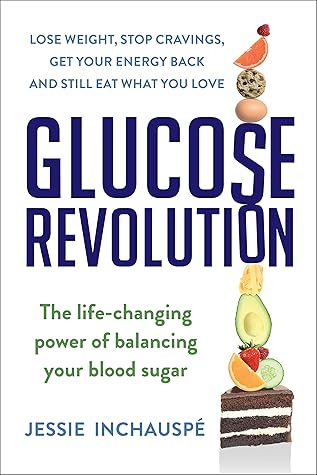More on this book
Community
Kindle Notes & Highlights
Read between
February 18 - February 20, 2025
To feel my best, it became clear that I had to avoid big spikes and dips in my glucose levels.
When there are too many free radicals to be neutralized, our body is said to be in a state of oxidative stress.
Oxidative stress is a driver of heart disease, type 2 diabetes, cognitive decline, and general aging. And fructose increases oxidative stress even more than glucose alone. That’s one of the reasons that sweet foods (which contain fructose) are worse than starchy foods (which don’t). Too much fat can also increase oxidative stress.
He discovered that browning happens when a
glucose molecule bumps into another type of molecule. That causes a reaction. The second molecule is then said to be “glycated.” When a molecule is glycated, it’s damaged. This process is a normal and inevitable part of life, and it’s why we age, why our organs slowly deteriorate, and why we eventually die. We can’t stop this process, but we can slow it down or speed it up.
The more glucose we deliver to our body, the more often glycation happens. Once a molecule is glycated, it’s damaged forever—which is why you can’t untoast a piece of toast.
Fructose molecules glycate things 10 times as fast as glucose, generating that much more damage. Again, this is another reason why spikes from sugary foods such as cookies (which contain fructose) make us age faster than do spikes from starchy foods such as pasta (which doesn’t).
Once insulin has stored all the glucose it can in our liver and muscles, any glucose beyond that is turned into fat and stored in our fat reserves. And that’s one of the ways we put on weight. And then some. Because it’s not just glucose that our body has to deal with, it must also dispose of fructose. And unfortunately, fructose cannot be turned into glycogen and stored in the liver and the muscles. The only thing that fructose can be stored as is fat.
Fiber has three superpowers: First, it reduces the action of alpha-amylase, the enzyme that breaks starch down into glucose molecules. Second, it slows down gastric emptying: when fiber is present, food trickles from sink to pipe more slowly. Finally, it creates a viscous mesh in the small intestine; this mesh makes it harder for glucose to make it through to the bloodstream. Through these mechanisms, fiber slows down the breakdown and absorption of any glucose that lands in the sink after it; the result is that fiber flattens our glucose curves.
Foods containing fat also slow down gastric emptying, so eating them before rather than after carbs also helps flatten our glucose curves. The takeaway? Eating carbs after everything else is the best move.
Buy bread that is dark and dense, made from rye with a sourdough starter.
It’s traditionally German and usually called seed bread or pumpernickel. Those contain the most fiber.
So if you want to improve just one aspect of your daily food habits, eat a glucose-healthy breakfast for maximum impact.
The best options to keep your glucose levels steady are berries, citrus fruits, and small, tart apples,
The worst options—because they have the highest amount of sugar—are mangoes, pineapple, and other tropical fruit. Make sure you eat something else before them.
The best sweeteners that have no side effects on glucose and insulin levels are: Allulose
Monk fruit Stevia (look for pure stevia extract because some other forms of it are mixed with glucose-spiking fillers) Erythritol
There are some artificial sweeteners I’d recommend you avoid, because they are known to increase insulin and/or glucose levels, especially when combined with foods, or cause other health issues. They are: Aspartame M...
This highlight has been truncated due to consecutive passage length restrictions.
Acesul...
This highlight has been truncated due to consecutive passage length restrictions.
Exercise is therefore considered a hormetic stress on the body. This means that it is a type of beneficial stress that causes our bodies to become more resilient.
THE 30-SECOND NO-GLUCOSE-SPIKE SAVORY SNACK Apple slices smeared with nut butter Apple slices with a hunk of cheese Bell pepper slices dipped in a spoonful of guacamole Celery smeared with nut butter A cup of 5% Greek yogurt topped with a handful of pecans A cup of 5% Greek yogurt with nut butter swirled into it A handful of baby carrots and a spoonful of hummus A handful of macadamia nuts and a square of 90% dark chocolate A handful of pork rinds A hard-boiled egg with a dash of hot sauce A hunk of cheese Lightly salted coconut slivers Seeded crackers with a slice of cheese A slice of ham A
...more


